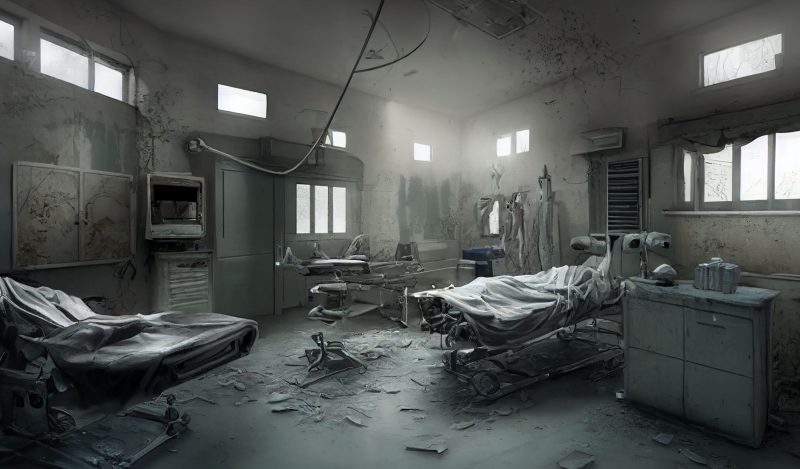Even those who already know a lot about the recent man-made medical disaster may be shocked by the raw, firsthand accounts in this book of the horrors perpetrated at many American, British, and Canadian hospitals. Many do not yet fully realize that great numbers of putative “Covid deaths” were actually the result of deliberate hospital medical malfeasance.
What follows is a review of What the Nurses Saw: An Investigation Into Systemic Medical Murders That Took Place in Hospitals During the COVID Panic and the Nurses Who Fought Back to Save Their Patients by Ken McCarthy.
McCarthy interviews nurses, a respiratory therapist, and a public medical expenses analyst to reveal the terrible practices of many hospitals dealing with the Covid situation. His previous work includes the documentary HIV=AIDS-Fauci’s First Fraud, which explores an older debacle mirroring recent events – from the unreliable tests for HIV to the deadly, ineffective (but profitable) medical interventions undertaken to combat an overblown disease threat.
The book really helps the reader appreciate the heroic, vital role that nurses often play in hospital care. They have been indispensable advocates for their patients since the days of Florence Nightingale, whose quotes begin most chapters in the book. As one interviewed nurse puts it, “We troubleshoot to prevent errors…the value of a nurse is, her ability to critically think through these dangerous situations instead of just following orders blindly.”
However, during Covid, responsible nurses were unable to perform their advocate role in many hospitals. Under the cover of a medical emergency, many hospitals devolved into rigidly hierarchical, protocol-driven, inflexible, brutal institutions paying more attention to orders from above than to the well-being of their patients.
Nurses and others who opposed or questioned dangerous, irresponsible practices were ruthlessly punished and often fired. In other cases, nurses voluntarily had to quit their jobs because they were unable to continue witnessing the murder and abuse of patients.
In McCarthy’s words, “You couldn’t have created a better system if your goal was to use the doctors and nurses in hospitals to kill as many people as possible.” Nurse Kimberley Overton also remarks, “It was the complete and total medical mismanagement of Covid that was killing all of our patients.”
The nurses recount a multitude of examples of this “medical mismanagement.” They include the widespread use of the deadly, ineffective antiviral drug Remdesivir, the rejection of steroids and other standard anti-inflammatory drugs, and the common misuse of ventilators by unqualified staff. Such practices led to many unnecessary deaths, often later attributed incorrectly to Covid.
On top of that, many hospitals administered excessive amounts of potentially lethal sedatives such as midazolam, fentanyl, and morphine in order to induce passivity in resistant or anxious patients. However, these sedatives often had the effect of exacerbating their breathing problems, at times fatally.
Overton recounts one instance in which a patient received three different such medications in the space of twenty-nine minutes. At the same time, many patients were not administered medicines to prevent blood clotting, an obvious danger for bedridden, immobile patients.
The motive for these institutionalized crimes was money, plain and simple. Large amounts of money can be a very corrupting influence, as we can observe in various realms, including academia, which often receives huge amounts of money from foreign governments such as China.
Staggering sums went into the coffers of hospitals that adhered to the strict treatment protocols for presumed Covid patients. These massive funds came from a variety of government programs and agencies. For example, in the US in 2020, the CARES Act (Coronavirus Aid, Relief, and Economic Security) showered healthcare providers with $178 billion.
In his interview, A. J. DePriest reports, “HCA, one of the largest for-profit hospital systems in America, received about a billion dollars in CARES Act relief funds. Tennessee’s billionaire Frist family, which owns HCA, doubled their wealth between March 2020 and 2021, from $7.5 billion to $15.6 billion.”
To guarantee receipt of such funds, hospital administrators, acting in sync with federal bureaucrats, followed the written rules rigidly and rejected any contrary feedback. The only criterion was whether or not something was in the protocols. The interviewed nurses constantly heard doctors and others parrot this justification.
With the application of each approved medical intervention for a patient, hospitals received a separate large bonus payment from government programs. In particular, ventilators and Remdesivir, both highly dangerous interventions, procured large amounts of money for hospitals using them.
Aiding the profiteering hospitals, the UN, the mainstream news media, and much of the Internet helped to maintain this inflexible, destructive system by vilifying and persecuting nurses fighting for the lives and rights of patients. Nurse Nicole Sirotek explains how the UN and the WEF created Team Halo to mobilize mobs on social media like Facebook and TikTok (UN Under-Secretary-General for Global Communication Melissa Fleming has admitted working with Halo). Activists recruited and directed by Halo proceeded to attack dissident nurses and doctors on social media and besiege state nursing boards, which led to nurses having their licenses suspended.
The harassment did not stop at such things. Sirotek recounts that “people broke into my house, vandalized my car, and threatened to rape and murder my children. They poisoned my dog.”
Nevertheless, those interviewed by McCarthy did not respond as their attackers expected – by backing down. Despite their hardships, a number went on to form organizations like Frontline Nurses and create services to rescue many abused patients and their families from the hospital holocaust. In doing so, they demonstrated that they are the true heirs of Florence Nightingale.
The Kindle ebook version on Amazon is currently only $0.62 US dollars and 99 yen in Japan, certainly a bargain at that price.
Join the conversation:


Published under a Creative Commons Attribution 4.0 International License
For reprints, please set the canonical link back to the original Brownstone Institute Article and Author.









